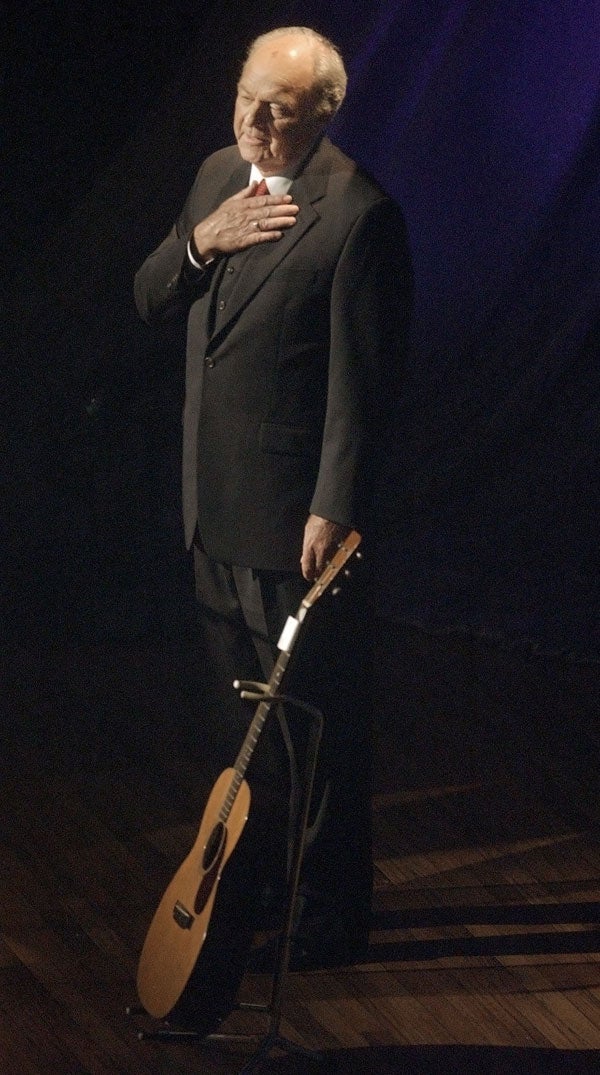Marshall Grant: Bassist at the heart of Johnny Cash’s distinctive sound

Your support helps us to tell the story
This election is still a dead heat, according to most polls. In a fight with such wafer-thin margins, we need reporters on the ground talking to the people Trump and Harris are courting. Your support allows us to keep sending journalists to the story.
The Independent is trusted by 27 million Americans from across the entire political spectrum every month. Unlike many other quality news outlets, we choose not to lock you out of our reporting and analysis with paywalls. But quality journalism must still be paid for.
Help us keep bring these critical stories to light. Your support makes all the difference.
With musicians who could scarcely play their cheap and battered instruments, took drugs and drank heavily, fired guns and made bombs, Johnny Cash and the Tennessee Two sounds like a punk band from the mid-1970s, but they were the most seminal of the country groups from 20 years earlier. Marshall Grant played bass and can be heard on all their early records including the famed "Folsom Prison Blues" and "I Walk The Line". "We didn't work hard to get that boom-chicka-boom sound," he later admitted, "It was all we could play."
Marshall Grant was born in Bryson City, North Carolina in 1928. He moved to Memphis in 1947 and worked as a car mechanic at the Automobile Sales Company on Union Street. He sang and played guitar with his workmates, Luther Perkins and "Red" Kernodle.
Johnny Cash completed his military service in 1954 and wanted to be a professional country singer. His oldest brother, Roy, was the manager of the Automobile Sales Company and told him of the three would-be musicians. They practised together and as they all played rhythm guitars, Grant bought a double-bass, which he repaired with duct tape, and Kernodle switched to steel guitar, but left due to the stress of playing in public.
They auditioned for Sam Phillips' Sun Records, which was also on Union Avenue, and passed at their second attempt. Their first single, "Cry! Cry! Cry!" and "Hey Porter" in June 1955, made the US country charts. The stark sound, enhanced by echo, suited the simplicity and directness of Cash's songs and in 1956 they had a major country success with "Folsom Prison Blues" and a crossover pop hit with "I Walk The Line". Cash joked about their minimalist style on the hit single, "Luther Played The Boogie". Despite his limitations, Grant was a good showman, energetic and smiling, and Cash would introduce him by saying, "And on my left on chewing gum, Mr Marshall Grant." The story of those early years where they recorded alongside Elvis Presley, Jerry Lee Lewis and Carl Perkins is told in the current West End success Million Dollar Quartet.
Piqued because Phillips would not let him record a gospel album, Cash moved to Columbia in 1959 and, with the addition of WS "Fluke" Holland on drums, they became the Tennessee Three. Cash recorded in many styles and moods but he rarely deviated from that boom-chicka-boom beat.
The band would tour with fishing equipment, guns and Grant's home-made bombs. They would shoot birds, and once Grant fired a pistol after the opening act, Gordon Terry, sang "Johnson's Old Grey Mule". He said, "I'm just putting the mule out of its misery." They would explode bombs in empty fields, but once Grant put a bomb down a toilet in a New Jersey hotel. It drifted down the piping and exploded in the men's toilet below, drenching all the unsuspecting customers.
Grant did not drink or smoke and he nursed Cash through his drug addiction. Often they had to cancel shows but once he found him unconscious in a hotel room in Toronto, gave him artificial respiration and, quite amazingly, got him to perform an hour later. Cash's second wife, June Carter, would soon be helping Grant to look after him.
Shortly after making the brilliantly atmospheric album, Johnny Cash At Folsom Prison, in 1968, Luther Perkins died from injuries while falling asleep with a lighted cigarette. Carl Perkins, who was no relation, joined Cash's road show in his place and widened their musicality.
In 1969, Cash made the documentary, Johnny Cash At San Quentin, which included the million-selling single, "A Boy Named Sue". Although Cash's 1970s records have their moments ("Sunday Morning Coming Down", "Man In Black", "One Piece At A Time"), many of the albums were lacklustre.
In 1980 Cash sacked Grant, who sued for wrongful dismissal. The exact details were not made public but Grant settled out of court for $800,000. Grant managed the Statler Brothers, and he had played bass on their 1965 hit, "Flowers On The Wall", recorded when they were part of Cash's roadshow.
Grant was reconciled with Cash at a concert in 1999, four years before Cash's death, and he wrote a memoir, I Was There When It Happened, in 2006. Grant lived in Hernando, Mississippi and he died when appearing as a celebrity guest at a Johnny Cash Festival in Jonesboro, Arkansas.
Spencer Leigh
Marshall Grant, musician: born Bryson City, North Carolina 5 May 1928; married (one son); died Jonesboro, Arkansas 7 August 2011.
Subscribe to Independent Premium to bookmark this article
Want to bookmark your favourite articles and stories to read or reference later? Start your Independent Premium subscription today.
Join our commenting forum
Join thought-provoking conversations, follow other Independent readers and see their replies
Comments